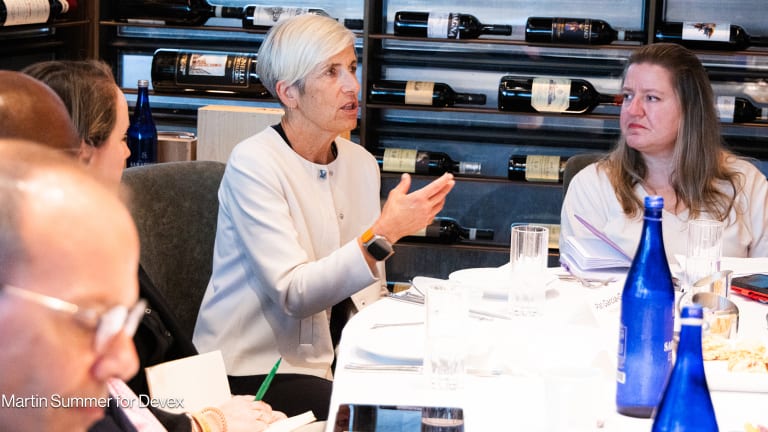
BARCELONA — The COVID-19 pandemic has made the critical role of health care workers more prominent than ever before. Pushing health systems, supply chains, and the global workforce to their limits, the current crisis has exacerbated existing challenges they face.
On Tuesday, Devex and partners hosted a signature virtual event to shed light on some of the difficulties for the health workforce in many low- and middle-income countries, as well as solutions that could help them do their jobs more efficiently and — most importantly — safely.
Strengthening community health and preparedness
Watch all of the sessions from “On the Frontlines: Empowering health workers in the era of COVID-19” on YouTube.
A panel conversation with global health leaders emphasized the need to invest in preparedness and in communities to strengthen health systems and ultimately empower health care workers.
There is currently no long-term plan for global health, said Dr. Agnes Binagwaho, vice chancellor of the University of Global Health Equity and former Rwandan minister of health, calling for increased investment in community health and infrastructure. “I’m not sure that it [health funding] is going at the right place to do the right thing," she said, adding that health starts at the community level.
"You can't control an epidemic without having the people with you. … People need to be … kept at the center throughout," said Dr. Emanuele Capobianco, director of health and care at the International Federation of Red Cross and Red Crescent Societies, highlighting the importance of investing in preparedness and communities to ensure that community systems are not the “forgotten child.”
Investing in health systems
There needs to be a radical rethink to reform health and see it as an investment, said Dr. Mickey Chopra, global solutions lead for service delivery in the health, nutrition, and population global practice of the World Bank. Finance ministers should see “that health is an investment and not an expenditure," he said.
One thing the coronavirus pandemic is doing is exposing how health systems function, and average citizens are starting to see the systemic nature of how health works, said Raj Kumar, president and editor-in-chief at Devex and one of the signature virtual event’s moderators.
People are starting to see what a system actually looks like, why systemic problems are so hard to solve, and why these cannot be solved with a one-off intervention, he said. “It is more effective to invest in the system than to try to put on a short-term solution when there’s a crisis.”
What health care workers need now
Amruta Byatnal, associate editor at Devex, also spoke to health care practitioners — including a community pharmacist and a deputy chief of mission for Médecins Sans Frontières in Sudan — about the change they want to see happen.
“You can't control an epidemic without having the people with you. … People need to be … kept at the center throughout.”
— Dr. Emanuele Capobianco, director of health and care, IFRCFarhan Yusuf, a health supply chain professional and youth advocate from Tanzania, called for more public-private partnerships. “That is very important so that the sectors can learn from each other and together come up with the right sort of solutions for when we are faced with challenges like this,” he said. Yusuf also emphasized advocacy “at all levels” — from the global to the community level — to promote health care workers and their needs.
Ngozi B. Opara, assistant director of nursing services at the National Hospital Abuja in Nigeria, highlighted the need for upskilling and reskilling health care workers. This is not just about financially supporting health care workers, she said, but also building capacity and providing training, as well as the necessary equipment. “Train people in the health sector [and] they are good to go”, she said, adding that funding is often slow and unpredictable, while capacity is a never-ending resource.
Opara also called for private sector actors partnering with the health sector to help with the provision of training and equipment — and “not leaving it only for the government.”
Watch all of the “On the Frontlines” sessions.
Visit the Duty of Care series for more coverage on how health systems can function better so that health care workers are supported and protected. You can join the conversation using the hashtag #DutyOfCare.









